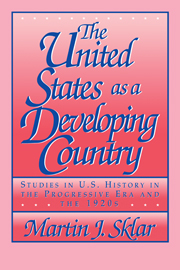 The United States as a Developing Country
The United States as a Developing Country Book contents
- Frontmatter
- Contents
- Preface
- I Periodization and historiography: The United States considered as a developing country
- II Studying American political development in the Progressive Era, 1890S–1916
- III Dollar Diplomacy according to Dollar Diplomats: American development and world development
- IV Woodrow Wilson and the developmental imperatives of modern U.S. liberalism
- V Some political and cultural consequences of the disaccumulation of capital: Origins of postindustrial development in the 1920s
- VI Disaffected with development: Henry Adams and the 1960s “New Left”
- VII The corporate reconstruction of American capitalism: A note on the capitalism–socialism mix in U.S. and world development
- Index
I - Periodization and historiography: The United States considered as a developing country
Published online by Cambridge University Press: 03 February 2010
- Frontmatter
- Contents
- Preface
- I Periodization and historiography: The United States considered as a developing country
- II Studying American political development in the Progressive Era, 1890S–1916
- III Dollar Diplomacy according to Dollar Diplomats: American development and world development
- IV Woodrow Wilson and the developmental imperatives of modern U.S. liberalism
- V Some political and cultural consequences of the disaccumulation of capital: Origins of postindustrial development in the 1920s
- VI Disaffected with development: Henry Adams and the 1960s “New Left”
- VII The corporate reconstruction of American capitalism: A note on the capitalism–socialism mix in U.S. and world development
- Index
Summary
Society … is the ultimate thing disclosed by an analysis of human relations.
Henry Carter Adams (1887)It is by now a familiar mark of sophistication to acknowledge that there can be no purely “objective” study of history, in the sense of its being entirely value-free: Objectivity is best served when the historian explicitly discloses the interpretive framework and underlying assumptions guiding the research and its outcome. Taken no further, however, this axiom can become a justification of subjective license, if not incoherence. The question remains whether, above and beyond rules of evidence and technical competence, there is a common standard of objectivity, which may be adopted by historians in forming comprehensive conceptions of an historical period and in guiding specialized inquiry as well, but which nevertheless leaves them free, even while maintaining the most rigorous criteria of logic and empirical method, to differ not only on normative matters, but also on the particular interpretations and conclusions they may draw from inquiry based on that common standard.
The principle of periodization itself offers a common standard satisfying these conditions. What general and special theories are to the meaning and indeed the very designation of facts in the physical sciences, so periodization may be to their meaning and designation in history. As referred to in this way, periodization means not the familiar device usefully invoked for narrative or connotative convenience, such as the Age of Jackson, the Gilded Age, the Progressive Era, Prosperity Decade, the New Deal, and the like.
- Type
- Chapter
- Information
- The United States as a Developing CountryStudies in U.S. History in the Progressive Era and the 1920s, pp. 1 - 36Publisher: Cambridge University PressPrint publication year: 1992


